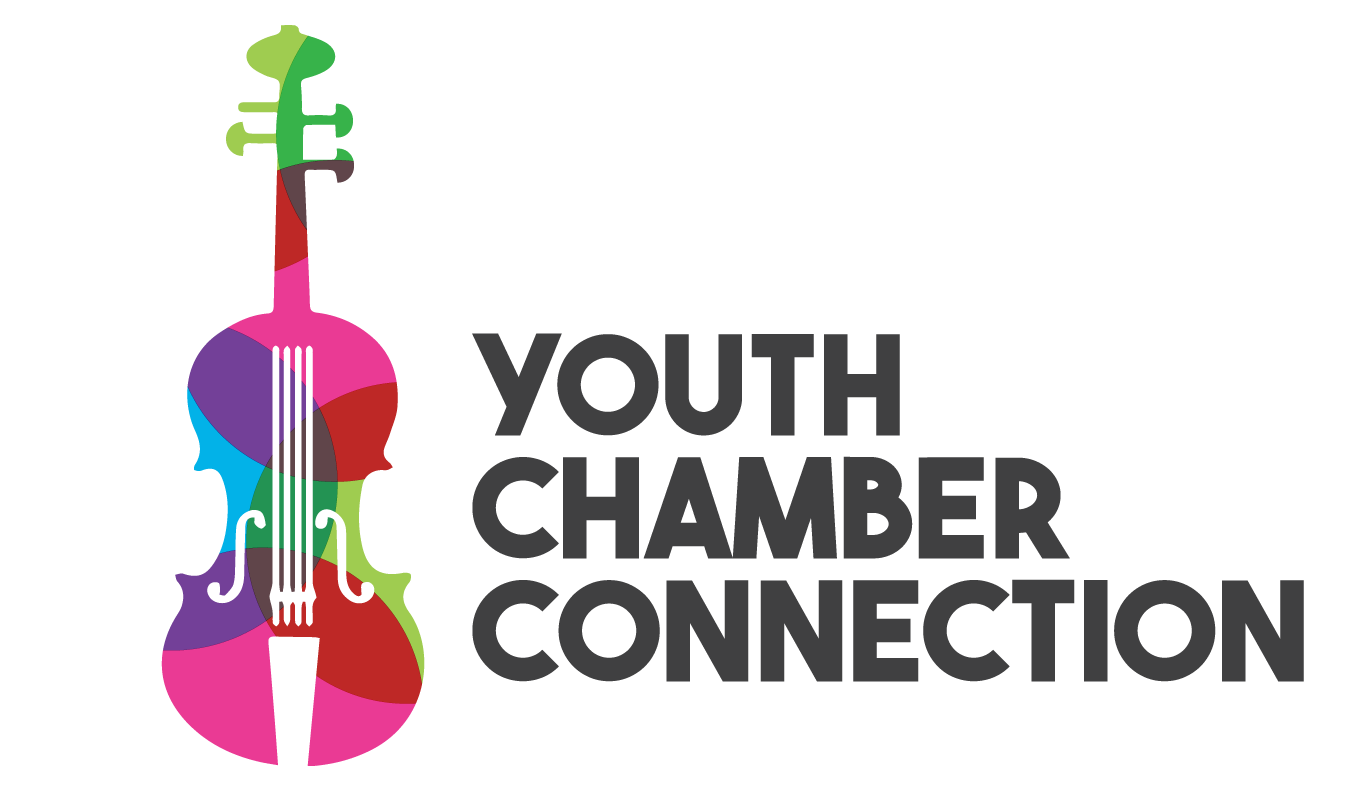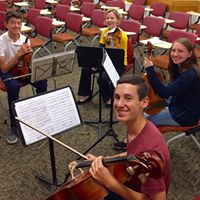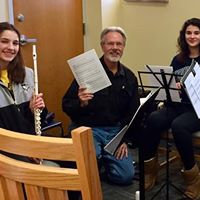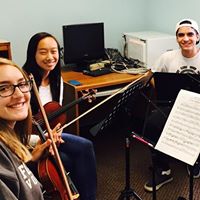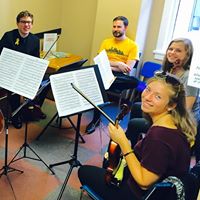Why Chamber Music?
“Playing chamber music is a fundamental part of music education. Not only does practicing chamber music open up a diverse and expansive range of beautiful repertoire to explore, it is also the most enjoyable way to practice music. Chamber music is a joy shared between equal partners who are working together to create a thing of perfection and beauty.”
—Earl Carlyss, longstanding former member of the Juilliard String Quartet, Juilliard faculty, former head of strings department at Peabody Conservatory and Indiana University, and longtime director of the Aspen Center for Quartet Studies
Joining a small ensemble is the most collaborative form of music making around! Every player has their own, individual part to play; and, at the same time, the handful of players learn to work together to play as ONE. Each musician must contribute fully for the group to achieve success. Students gain musical and interpersonal technical skills. They learn to listen to and watch each other closely, sometimes leading and other times following. They develop a musical imagination and self confidence as they test out ideas together; and they learn to give and be open to constructive criticism. Oh, also playing chamber music is fun!!!
The Importance of Chamber Music for Children by Meredith Kufchak, former Pittsburgh Symphony Orchestra violist, now Principal Viola for the Dallas Symphony, wonderfully explains the many reasons why chamber music is an asset to young musicians. Here are a few highlights:
“Some of my best friends growing up were the ones that I played chamber music with, because playing in an ensemble builds such a close bond.”
“…students are encouraged by their peers and also strive to meet the expectations of their peers…”
“In chamber music rehearsals, they learn to critique others, while still being respectful of each other and other’s ideas. This provides a strong basis for being able to teach others and also teach themselves.”
“Chamber music is an essential part of a music student’s education because it creates such strong musicians.”
We heartily agree. #ChamberMusicRocks!
We couldn’t have said it better ourselves! In 2015, Strings Magazine asked more than a dozen string professionals why they play chamber music, and you can read their inspiring answers here. Here are a few snippets:
Vicky Chiang, faculty at Peabody Conservatory and a member of the Aspen Trio: “Playing chamber music pushes me to contribute fully as a musician. It requires me to come to the rehearsals with a comprehensive understanding of the work and a compelling musical view. Then to engage with colleagues who may fortify or challenge that understanding is inspiring.”
Paul Colletti, faculty at the Colburn School: “For the performers, it is a shared journey to develop intellectually, emotionally, and musically, and often leads to a lifetime of friendships.”
Eugene Drucker, member of the Emerson Quartet: “Chamber music gives me a chance to be heard as an individual, and yet also to rely on the strengths and different musical personalities of my colleagues.”
Ilmar Gavilan, member of the Harlem String Quartet: “Reality check. Sometimes when you’re working on solo repertoire, you get used to your own errors…you don’t hear that you tend to rush or be a little flat on certain notes…but in a quartet you have three extra sets of ears to keep you in check. Conversely, if you are a little discouraged with your own playing, three other people will be there to help you regain your perspective.”
The connection between music and medicine: A recent article by the CBC reports a strong link between success in medical school and early training as a musician! Musicians learn to constantly reassess, reflect on what they did well, and determine what improvements need to be made - all skills which make for an excellent physician or surgeon [and YC2 adds, every other vocation too!]. One student interviewed stated, in particular, playing chamber music helped prepare her for the culture of medical school: “When you play chamber music, you are required to show up prepared, and bring a pencil. We were required to meet on our own time, to work together, to discuss what we wanted and how to achieve that."
https://www.cbc.ca/news/canada/newfoundland-labrador/medicine-music-connection-1.4770372
What is chamber music: Chamber music is a form of classical music composed for a small group of musicians, each with their own part to play. The name comes from centuries ago when small groups of musicians were hired to fit a palace "chamber." It is "the music of friends," and is often described as a "musical conversation," often played just for fun when musicians gather. Playing chamber music requires special skills, musical and socially, which differ from those required to play solo or in an orchestra including:
Collaboration: Chamber Music involves working together equally, sharing opinions and striving to come together to make something beautiful. Each individual voice is important, and so is the collaboration of the voices together.
Leadership: There is no conductor! Each member of the group has to be the leader at different times to help the group come together.
Responsibility: When there is only one student to a part, there is no ability to hide and each student must be responsible for learning his or her music! With such a small ensemble, attendance and punctuality also become very important; students must be responsible for regular, faithful attendance and being on time for rehearsals and/or coachings.
Intonation: In small ensembles, students must focus and learn the skill of playing in tune.
Performance Skills: The ability to perform in front of an audience is another skill that is honed in chamber music. Control of performance nerves translates to auditions, interviews, presentations, and any type of public speaking.
And… it’s FUN!: Chamber Music is a great combination of playing music and spending time with friends!
More about the benefits of chamber music:
http://www.wiltonmusicstudios.com/Blog/?p=3
https://www.woodwindchambermusicrepertoire.com/a-woodwind-blog/the-making-of-a-chamber-musician
https://www.sfcv.org/article/music-close-to-the-heart-why-i-love-chamber-music
https://digitalcommons.csumb.edu/cgi/viewcontent.cgi?article=1550&context=caps_thes
